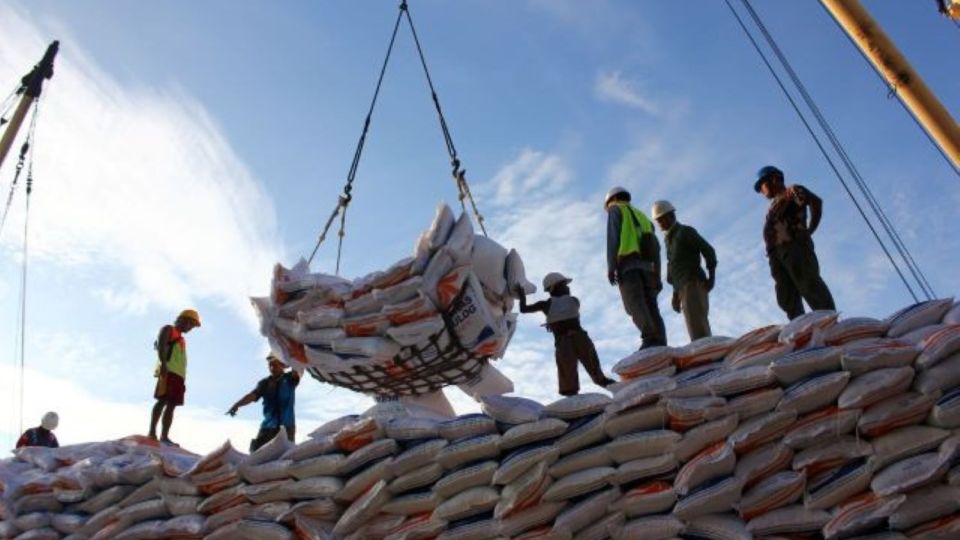Tags
Rice is not the issue: The Jakarta Post
Since Indonesia’s population keeps growing, nationwide demand for the grain only continues to rise. Local farmers cannot keep up, leaving the country dependent on imports to fill the gap between domestic supply and demand.

Workers unload rice imported from Thailand on Sept. 6, 2023, at Ujung Baru seaport in Medan Belawan, North Sumatra. PHOTO: ANTARA/ THE JAKARTA POST
JAKARTA – Without rice, most Indonesians would agree, a meal feels incomplete. Even though we now eat less rice per capita than we used to, it remains the unrivaled carbohydrate staple.
Because Indonesia’s population keeps growing, nationwide demand for the grain only continues to rise. Local farmers cannot keep up, leaving the country dependent on imports to fill the gap between domestic supply and demand.
The record rice imports that may be needed to cover this year’s demand should give us pause.
Acceding to the National Food Agency (Bapanas), some 5 million tonnes of rice may need to be shipped into the country this year as projections point to a mere 18.64 million tonnes of domestic supply through June, 2.47 million tonnes less than in last year’s first half.
Such import volumes would mark a significant increase from last year’s and come at a time when other countries, notably Thailand as a key supplier to Indonesia, have also been experiencing reduced harvests because of adverse weather.
The ongoing failure to ensure sufficient domestic supply of such a quintessentially Indonesian staple – though other countries have no less claim to that culinary tradition – is at least embarrassing. One could argue that not growing enough rice on home soil is even a strategic vulnerability for the archipelago.
Foreigners perusing restaurant menus may feel that there is more than enough rice in this country and that a more diversified diet, or at least replacing some of the white rice with a wholegrain variant, would do Indonesians good.
Indonesian public figures have also often suggested eating more other foods to reduce nationwide consumption of rice and hence avoid the need for imports.
However, it is doubtful that such a change would help at all with the issues at hand.
For such a course of action to succeed, whatever commodities are chosen as alternatives to rice would need to be cultivated in the country with similar efficiency to yield products of similar affordability.
And that is where the problems begin, because the same issues affecting rice production, such as a lack of available land, inadequate irrigation infrastructure and outdated cultivation methods, would affect any alternative as well.
Frankly, our entire agriculture sector is in dire need of deep structural reforms to increase productivity and efficiency. Per-hectare yields must rise to achieve overall output growth through intensification rather than extensification.
Aside from improved infrastructure, more machinery must be employed to bring down costs and reduce reliance on the type of hard labor many young people no longer find appealing.
Most importantly, perhaps, farms need to be consolidated into much larger entities run with a business mindset to achieve economies of scale.
The type of agriculture our country would be left with after proper reforms would make a vast chunk of the current agricultural workforce redundant. That might sound like a hard sell for any government, but no business in any sector, be it manufacturing, trade or tech, should continue to do with many people what they can do equally well or better with a smaller workforce. Neither should agricultural entities, whether they are agribusinesses, cooperatives or state-owned food estates.
In any case, a wholesale redesign of Indonesian agriculture would take many years to accomplish, so nobody would suddenly find themselves jobless. Instead, the reduction in the agricultural workforce would be a natural process as old people retire and fewer young people replace them.
Indonesia can learn much from other countries, such as Thailand, where drones hover over many rice fields. With a far smaller landmass, advanced farming allows Thailand not only to handily meet domestic needs but also export vast amounts.
Rather than being preoccupied with a state-run food estate program, the government should focus on agricultural reforms that leave no village behind and help farmers merge their plots, up their game and reinvent themselves as agricultural businesspeople.
https://asianews.network/rice-is-not-the-issue-the-jakarta-post/Published Date: July 3, 2024






